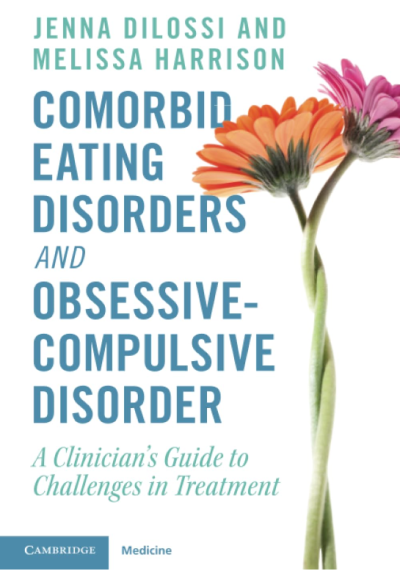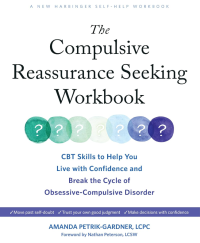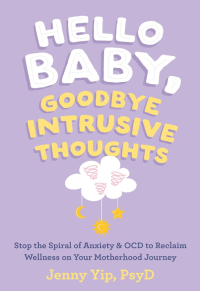
New ADAA Member Books: Fall 2024

New Book Addresses Clinical Approaches to Treating Those With Both Eating Disorders & OCD
Until recently, a comprehensive book dedicated to the dual diagnoses and treatment challenges of persons with both an eating disorder and obsessive-compulsive disorder (OCD) did not exist. Much less a clinician’s guide with tools and advice for health professionals working with patients with both diagnoses.
ADAA member authors Jenna DiLossi, PsyD, ABPP and Melissa Harrison, MA, LPC have extensive clinical experience treating patients with both eating disorders and OCD, as well as presenting at several conferences. The authors say that while the diagnostic overlap is well documented in the literature, there is still a dearth in published clinical information for navigating this “tricky presentation”.
The authors hope to fill the gap with their new book Comorbid Eating Disorders and Obsessive-Compulsive Disorder: A Clinician’s Guide to Challenges in Treatment. Numerous studies have shown that individuals with eating disorders have statistically higher rates of OCD and vice versa. Seeing these patients in their own outpatient practice, Dr. DiLossi and Harrison wanted to help other clinicians who might be working with similar clients and feeling challenged by the process.
“Our vision for the book is that it be used as a supplemental tool to provide evidence-informed guidance for clinicians in practice,” Dr. DiLossi told ADAA. “We hope to have some part in developing and empirically examining a systematic treatment protocol for this presentation down the road.”
The book, which includes case studies, clinical pitfalls, assessments, and suggested treatments, details the overlap between both illnesses and how comorbidity changes the overall presentations, but it is not all clinical and academic. The authors write candidly about the importance of the human psyche and being able to connect with their patients on an emotional level.
“It is crucial for clinicians to have an understanding of the theories that are the backbone to behavioral interventions for these patients,” said Harrison, “but also having a clear real-world picture of each patient’s core fears, possible individual outcomes, and their ability to cope and understand the relationship between the biological effects of being underweight and malnourished and increased obsessional thinking and compulsive behavior.”
The authors note that the book is intended for clinicians, but it is also suited for students, interns, and post docs who have not yet treated this population but have an interest in one or both diagnoses.
“We are incredibly grateful to the patients who have trusted us to manage their care over the years,” the authors told ADAA. “Each and every one of their journeys has been invaluable to our understanding of this diagnostic presentation and have played a vital role in this book’s development.”
Order Comorbid Eating Disorders and Obsessive-Compulsive Disorder: A Clinician’s Guide to Challenges in Treatment here.

OCD Specialist & Sufferer’s Book Assures Clients: Compulsive Reassurance Seeking is Treatable
As humans, giving and getting reassurance is important and natural to us. It helps us connect, feel validated, understood, and can help us to feel less alone. It is generally healthy and helpful. But when seeking reassurance becomes an uncontrollable relentless issue, falling into a cycle of obsessive-compulsive behavior, it is neither healthy nor productive.
ADAA member Amanda Petrik-Gardner, LCPC has written a step-by-step workbook to help address a need she found in working with clients and their families where excessive reassurance seeking compulsions were impeding the clients’ daily functioning and putting stress on family and friends.
The clinician’s new book The Compulsive Reassurance Seeking Workbook: CBT Skills to Help You Live with Confidence and Break the Cycle of Obsessive-Compulsive Disorder offers tools to reduce compulsions, make peace with uncertainty, and better manage OCD. Grounded in cognitive behavioral therapy (CBT), the workbook shows how compulsive reassurance seeking can interfere with relationships, and provides healthy coping strategies, without resorting to compulsive questioning.
Petrik-Gardner says compulsive reassurance seeking is exhausting and the condition can be a “sneaky and complex compulsion” where clients may not recognize they are doing it, families may have difficulty seeing how constant reassurance is unhelpful, and both clients and families are at a loss at what to do to break the cycle.
“This sort of behavior, more often than not, exposes you and those closest to you to increased levels of conflict, stress, and anxiety,” said the ADAA member. “It’s time to reassure yourself in a way that encourages and empowers you to seek genuine well-being, self-worth, and peace of mind from within.”
The workbook, intended for individuals with OCD, though loved ones and professionals may also find it beneficial, provides evidence based treatment options, an easy-to-follow guide with exercises, and stories to keep the readers motivated on their journey.
“As an OCD specialist with lived experience – and I shared many of my OCD stories in the workbook,” Petrik-Gardner told ADAA, “I was able to provide information all readers could relate to.”
The author wants readers to get a sense of normalization and hope, and walk away with a multitude of tools they can use. Not all reassurance is bad, says Petrik-Gardner, especially if it is out of curiosity or to gather information, but recognizing when a compulsion is part of our OCD sequence is essential and knowing there are several treatment options is crucial.

Moms Can Say Goodbye to Intrusive Thoughts with Strategies from Dr. Yip’s New Book
Hello Baby, Goodbye Intrusive Thoughts …You would be hard pressed to find a mother who is or was not anxious at some point during her journey through motherhood. Whether an expectant mom, a new mother, or one with two or more children, motherhood is difficult, demanding, and stressful. It can lead to physical exhaustion, mental fatigue, emotional vulnerability, frustration, and even chronic burnout.
ADAA member Jenny Yip, PsyD, ABPP does not deny the joys of motherhood. But as a mom of twin boys, parenting and OCD expert, author, renowned speaker, and child psychologist, she knows the challenges and complexities that come with being everything to everyone and having to be everywhere all at once, giving and giving until it seems like there’s nothing left to give!
In Dr. Yip’s newest publication, she gives us a compassionate book geared to support mothers whose worries and anxieties have gone beyond normal levels and now interfere with their daily functioning. Hello Baby, Goodbye Intrusive Thoughts: Stop the Spiral of Anxiety and OCD to Reclaim Wellness on Your Motherhood Journey addresses motherhood at different stages of the process, focusing on anxiety and OCD, and the frightening and sometimes disturbing intrusive thoughts that can affect some moms.
With evidence-based cognitive behavioral (CBT) and exposure and response prevention (ERP) strategies, anecdotes, and case studies, the book outlines ways that mothers with intrusive thoughts can spend less time in their heads and more time connecting with their children. As someone who battled postpartum OCD herself, Dr. Yip offers both professional and personal insight.
“I describe my own postpartum OCD journey in the book,” Dr. Yip told ADAA, “and what I learned is that we have to be able to tolerate uncertainty. We have to be ok imagining the worst and not letting it paralyze us. We have to live authentically with our families, be available to them emotionally and embrace the fact that anything can happen.”
Hello Baby, Goodbye Intrusive Thoughts provides a toolbox for all mothers with practical step-by-step exercises, heartfelt stories from moms across the globe, and the latest scientific research to help mothers all over the world practice habits that will nurture the bond between mother and child and help them reclaim their wellness on their motherhood journey.
“It’s so important for mothers to take ownership and prioritize their own self-maintenance, and self-maintenance is not just self-care,” Dr. Yip says, giving the example of a vehicle that will break down if it doesn’t get taken in for maintenance.
Self-care is optional, she explains. Self-maintenance, such as focusing and using strategies – like those in her book – for dealing with intrusive thoughts and learning to let go of what she calls the “perfect household disease”, is not.



